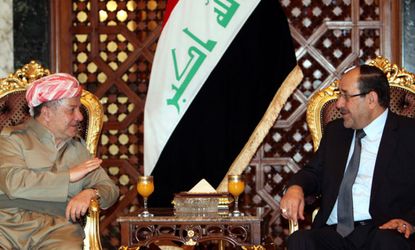How to save Iraq
It starts with giving Turkey a real seat at the table

Iraq's democracy is on the verge of collapse. Violence is engulfing the country as fighting rages in neighboring Syria.
As President Obama prepares to host Iraqi Prime Minister Nouri al-Maliki's this week in Washington, it is a crucial moment for the U.S. to change course with its Iraq policy. As is, the U.S. is only contributing to Iraq's woes by clinging to an outdated "one Iraq" policy that emboldens Iraq's divisive central government.
Yet there is a path forward. Washington must rapidly change course and partner with a key NATO ally, Turkey, to empower Iraq's autonomous Kurdistan region and large Sunni minority. Establishing balance along Iraq's ethno-sectarian fault lines is the only way to avoid the bloody fragmentation of the country — and prevent further regional strife.
Subscribe to The Week
Escape your echo chamber. Get the facts behind the news, plus analysis from multiple perspectives.

Sign up for The Week's Free Newsletters
From our morning news briefing to a weekly Good News Newsletter, get the best of The Week delivered directly to your inbox.
From our morning news briefing to a weekly Good News Newsletter, get the best of The Week delivered directly to your inbox.
Iraq has largely fallen off the U.S. foreign policy agenda since the 2011 withdrawal of U.S. forces. Over the past two years, Washington has pursued a passive "one Iraq" policy that prioritizes relations with Iraq's central government. This has excluded the Kurdistan Regional Government ("KRG") and the Sunni community from key conversations with America.
Instead of embracing the KRG and its pro-American leanings, the U.S. continues to keep it at arms length. The U.S. is opposed to any effort it believes will weaken Iraq as a whole, such as granting greater autonomy to Iraq's Sunnis and/or Kurds against Baghdad's wishes.
Meanwhile, Iraq's central government is riddled with divisions, mired in corruption, and dysfunctional. Prime Minister al-Maliki has consolidated power (often through extra-constitutional means), outmaneuvered rivals, and forcibly silenced critics. He continues to persecute Iraq's large Sunni minority and to allow Iranian planes to fly over Iraqi territory — resupplying Syrian government and Lebanese Hezbollah forces over vociferous U.S. objections. Al Qaeda in Iraq is now resurgent, and contributed to making this past July the most deadly month in Iraq since 2008.
Relatively safe and stable, the KRG is Iraq's most significant success story. Its resurgence can be credited, in part, to neighboring Turkey. The KRG's burgeoning ties to Turkey are driving economic growth, especially in its rapidly developing oil and gas industry. Meanwhile, many of Iraq's Sunnis look to the KRG's autonomy, security, and economic success with envy and resentment.
Sign up for Today's Best Articles in your inbox
A free daily email with the biggest news stories of the day – and the best features from TheWeek.com
Turkey can help Iraq's Sunnis — who are largely leaderless — to unite and organize themselves politically. Ankara can serve the role of broker to constructively manage Iraq's sectarian dynamics if approached humbly and pragmatically by Baghdad. With greater Turkish involvement, Iraq's Sunnis can also gain balance with al-Maliki's government and check Iranian interference.
But the U.S.'s current policy complicates Turkey and the KRG building closer ties. Washington is opposed to the KRG's efforts to unilaterally export oil and gas to Turkey, because its risk-averse approach seeks to preserve Iraq's status quo. Yet, by expanding energy ties with Turkey, the KRG will get the economic stability and leverage it desperately seeks. From a U.S. perspective, this is good news. It would lead to an empowered KRG — and in turn, a more stable future for Iraq as a whole.
While Washington has not yet adopted this logic, Ankara already is embracing it with gusto. To be clear, Turkey wants the KRG to remain part of Iraq, and not split off into a new state. Turkey believes that an independent KRG would threaten its territorial integrity — because of Turkey's large Kurdish population — and is therefore much more motivated than the U.S. to ensure Iraq remains a unified state. Washington would be wise to embrace Turkey's commonsense views.
Together, the U.S. and Turkey can more effectively pursue a balanced policy — one that addresses al-Maliki's legitimate concerns — while encouraging the KRG and Baghdad to find negotiated solutions to Iraq's myriad of political disputes. Iraq's only hope for a stable, united society is through empowering its Sunni and Kurdish minorities such that they do not fear oppression by al-Maliki's government.
As the Middle East's largest and Europe's fastest-growing economy and population, Turkey is uniquely situated to play a consequential role in a region critical to U.S. national interests. By binding Washington and Ankara more closely together in areas where concrete cooperation is possible (and compartmentalizing differences), these two historic allies can bring greater stability to Iraq and the Middle East.
Specifically, the U.S. should empower Turkey to lead responsibly in its own neighborhood and serve as a regional broker. As a first step, it is important to clearly articulate U.S. policy toward Turkey, Baghdad, and the KRG. Washington must explain how it fits into a broader vision for the U.S.-Iraqi-Turkish partnership. Prime Minister al-Maliki's November 1 visit to the White House is the perfect opportunity to begin to deploy this new policy approach and send a powerful message.
Active U.S. support for cooperation between the KRG, Turkey, Iraq's Sunnis, and the Baghdad government is essential. And whatever al-Maliki may publicly proclaim during his upcoming visit, everyone has much to gain.
By investing in partnerships — across ethnic and historical divides — Iraq and the broader region can create a brighter future.
Eli Sugarman and Joshua Walker are the co-authors of the recently released policy report “Iraqi-Kurdistan and Turkey: America’s Middle-Eastern Silver Lining,” published by The Center for National Policy. Both are fellows at the Truman National Security Project.
Create an account with the same email registered to your subscription to unlock access.
-
 'No war is good'
'No war is good'Today's Newspapers A roundup of the headlines from the US front pages
By The Week Staff Published
-
 The Week Unwrapped: will the US end child marriage?
The Week Unwrapped: will the US end child marriage?Podcast Why some states have no lower limit on marriage age, plus Black maternal health and the price of olive oil
By The Week Staff Published
-
 Perplexity AI: has Google finally met its match?
Perplexity AI: has Google finally met its match?In The Spotlight Generative AI start-up provides fast, Wikipedia-like responses to search queries
By Chas Newkey-Burden, The Week UK Published